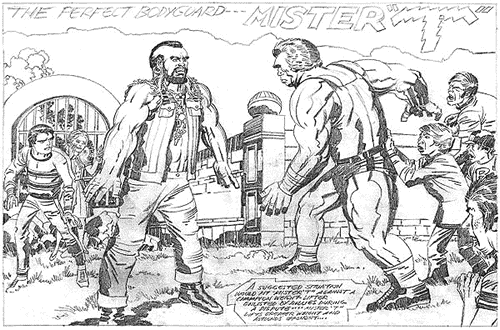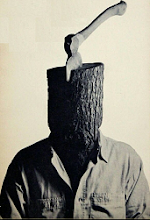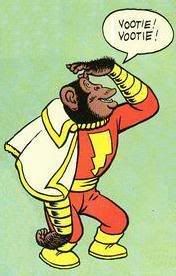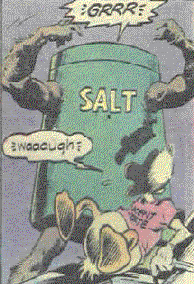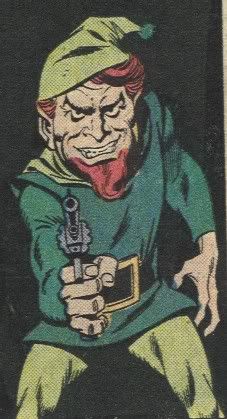The original
Hourman was a simple character from the early forties. A chemist, Rex “Tick-Tock” Tyler, invented a super-pill called Miraclo that gave him superhuman strength, speed and toughness for exactly one hour, down to the second. He decided to become a superhero, of course.
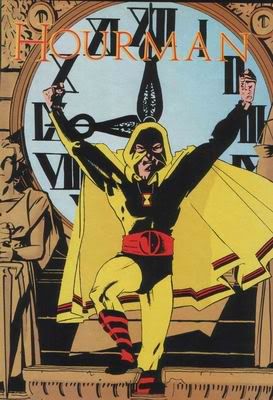
Never much more than a bit player, Hourman’s one claim to fame, such as it was, came during his revival in the sixties when he became addicted to Miraclo. (In the forties, a hero getting powers from pills didn’t bother parents’ groups; in the sixties, um, well, it did.) Aside from that one character trait, Rex Tyler’s always been an empty mask.
In the eighties, Rex’s estranged son became the new Hourman. Rick Tyler also became addicted to Miraclo. To add to the pathos, he also got cancer from the drug, as Miraclo was formulated only for his father’s specific body chemistry. That gave Rick two stories: addiction plus recovery.
Whee-ha.
To clean up some redundancies and try to make things a bit more interesting, the Powers That Be messed with the Hourmen. The “Zero Hour” mega-crossover event in the mid-nineties killed off Rex. Rick fell out of use. Then the “DC One Million” mega-crossover event of a few years ago introduced a third version of Hourman, a robot.
The robot Hourman, known as Tyler, came from the 853rd century. I know next to nothing about him, except that he’s the only Hourman to have his own series. From what I’ve gathered, Tyler had time manipulation powers, was an otherworldly naif, and ended up as a pile of rubble in a recent issue of JSA.
After the cancellation of the robot Hourman's series, Rick re-emerged, this time as a member of the Justice Society. He beat his cancer and obtained a reformulated Miraclo keyed to his body chemistry. He also received a new superpower from the robot Tyler: the ability to see one hour into the future. These visions are almost always of impending disaster or danger. He can’t control them, but they do make handy plot devices.
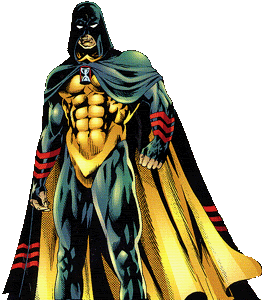
Comics being comics, Rex returned from the dead last year. He has reconciled with his wife and son. Rick continues to serve in the Justice Society.
And lordy, are they both boring.
Rex is the
Bad Daddy Trying to Make Up for It. That’s all. Rick is the
Twelve-Step Superhero. He is defined by his drug addiction and daddy issues. Anytime Rick is featured in a story, one of those two issues is guaranteed to come up.
Gack.
Dammit, the character of Hourman doesn’t have to be lame.
How about Harveyizing Rick?
----------------
The Inner ManWhat kind of a jackass would give himself a superhero name based on his greatest weakness?
Why doesn’t Superman call himself “Kryptonite Guy?” Or the Martian Manhunter call himself “Set Me On Fire Man?”
The Harveyized Rick, like his father, uses the name to spit in the eye of death. Calling himself “Hourman” is a show of defiance.
The Harveyized Hourman is a tenacious man, born to fight. Rick will never give up, ever, on anything. Even when he should. He risks death more than the average superhero and could justly be labelled foolhardy.
The Harveyized Rick was a selfish jerkass early in life, lashing out and not able to see past his own desires. He became Hourman in large part to give the old man an “up yers.” He took on the name to both mock and outdo his loathed father. But something happened he didn’t expect. Engaging in conflict after conflict, Rick’s horizons broadened. He saw that actions have consequences, and that other peoples’ lives matter.
He could keep the whole addiction backstory as well. The point of this re-interpretation is that now the addiction isn’t his defining characteristic.
-----------------
Meh.
The revamp above would make him a slightly more interesting bit player in the JSA, no more. He’d be…okay.
Goddammit, “okay” will not do! Greater revisions are required!
And I need more practice before National Novel Writing Month!
Let’s make us a new Hourman!
How about a four-issue miniseries?
---------------------
HOURMAN: THE FIRE THAT CONSUMESIssue One: We see a man in an Hourman costume outside of a gas station late at night. The page is broken up into a couple of panels. First-person narration from the dude in the costume explains that he feels ridiculous. At the end, he adds “This suit makes me look like a mental patient.”
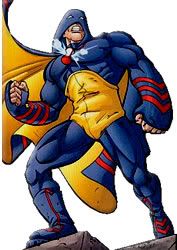
Next page is a double-page splash of Hourman fighting three half-robot, half-dog creatures, each one the size of a minivan. Spilled gasoline catches on fire, the whole place goes up.
Hourman wins the fight and flees the area. We see him slip into an apartment in a large complex outside of St. Louis. His narration continues, explaining that there are no such things as giant killer robot dogs, time travel, or men with super-strength. He tells us that his name is Jack Durrance and that he’s freaking out.
Just as he removes his mask, his wife Lily enters the room, also freaked. They embrace but can’t bring themselves to talk directly about what’s going on. In the corner of the room we see a steel case the size of a suitcase and a smashed-up robot head.
We’re treated to a brief flashback and explanation from Our Hero. The case and the robot head landed on the hood of his car the day before. The fizzling robot spoke Jack’s name and explained that a heap of trouble is coming, how the gauntlets in the case inject a drug called Miraclo that grant one hour of super-strength out of every twenty-four, and that the other doohickey in the case is very, very important.
Jack puzzles over the rest of the equipment built into the super-suit. Aside from the suit and the gauntlets that inject the one-hour wonder drug into his system, he found a doohickey about the size of a pack of cigarettes (or an iPod, for you youngsters) stuck to the belt. He detaches the doohickey from the belt and looks at it with Lily. It has a shiny surface and what looks like a wee screen.
As they talk over what to do, the robot head rolls off of the top of their bureau, across the floor, and latches its “teeth” on his leg. The iPod doohickey hums for a second and Jack disappears in a flash of light.
Jack rematerializes in a forest blanketed by snow. He looks at the doohickey. Its screen reads “Korea--Wonju--614 CE.” A voice comes from the snow around Jack’s legs. He finds the robot head under a few inches of powder.
In calm tones, the head explains to Jack that a man known only as the Hospodar has been selectively changing the past to shape a future that matches his desires. The Hospodar has prevented the existance of anyone who could stop him and shaped events to direct the development of science and technology in ways beneficial to his goal.
The head goes on to say that events coalece in the year 2027 to bring the Hospodar to power, where he will reign for thousands of years. All that humanity has struggled to build throughout history will be swept away except those that add to the glory of the Hospodar.
The gear Jack found came from a superhero known as Hourman, one of the many people prevented from existing by the Hospodar's actions. Before the villain struck, generations of Hourmen fought for justice and goodness and whatnot. The robot was a friend to several of these Hourmen.
Jack asks the robot why give it to him, of all people. The robot explains that the strength-enhancing drug Miraclo only worked for the individual hero himself. In this altered timeline, Jack was the closest genetic match the robot could find for the last Hourman. He's the best hope mankind has to ever live free.
Jack’s mind spins. The story is insane, but then again, he did just get into a fight with giant cyber-dogs, catch on fire, and teleport to a snowy mountainside in what very well might be seventh century Korea.
The robot head goes on to say that in those millenia of tyranny, there was a brief window where the villain could be defeated: the year 2212, when a natural disaster and a series of technological breakthroughs weakened his control. By 2213, he had re-established his rule with greater fury than before.
Jack, freezing on the mountainside, thinks this is a very bad idea. There has to be another way, he says. The robot head says nothing.
The doohickey activates and the two fade away. They reappear in the year 2212 in a public square in a major unnamed city. The world appears shiny and happy, but fear and psychosis lurk behind every corner. Some people have blissful expressions on their faces and small devices clinging to their heads. Others look like hunted animals waiting to make a break for it.
Tiny floating security bots notice the man in the cape and cowl toting a broken robot head. “Counselor” droids emerge from the sidewalks, where they are normally embedded. They grab him. Jack tries to activate the Miraclo. The time-lock mechanism shows another twelve hours must pass before he can use the Miraclo again. He resists the droids anyway, to no effect.
The Counselors take him to the Green Dome, the nearby palace of the Hospodar. The Evil Overlord wants to get a look at this would-be superhero.
This will require all sorts of painful procedures, of course.
A frightening-looking dingus heads for Hourman’s head as issue one concludes.
Issue Two:The issue begins with Jack in an interrogation chamber, a scary-looking dingus about to slap onto his head. Four spheres of light encircle his head and a procedure called “denaturing” is about to begin when Jack yells that he’ll explain everything, but only to the Hospodar himself.
Curious about this very ususual man and his strange equipment, the interrogators throw Jack into a holding cell and arrange for an audience with the Hospodar. Images of Lily drift into Jack’s mind. He wants to go home but he doesn’t know how. Only the damn robot head can pilot the iPod doohickey.
Hours later, Jack is brought before the Master and Lord of the Earth. The Hospodar is nine feet tall, a horrifying fusion of man, machine, and who-the-hell-knows-what. He gives off the smell of alcohol on hot metal. Hourman tries to keep his wits about him and doesn’t do a stellar job. The robot head begins to talk to Hospodar, yammering all sorts of gibberish about nobility, the nature of rule, and how very handsome the Hospodar is.
The Hospodar moves in close, threatening Hourman. Just then, one of Hourman’s gauntlets beeps. The twenty-four hours between Miraclo hits are up.
Jack pushes the button on his gauntlet to regain his superpowers. He drives his fist into Hospodar’s body with a satisfying “WHA-THOOM!”
A big-ass fight breaks out, smashing through walls. Hourman and Hospodar crash out of the Green Dome and tumble onto its grounds. A crowd gathers as Hourman beats the living crap out of Hospodar and cheers as Jack rips the head clean off of the cybernetic tyrant. Woo! The world is saved!
Or not. Troops come from everywhere and Jack hears word that he’s killed one of Hospodar’s many clone avatars, not the real thing.
Jack and his robot head bolt into the crowd and seek to escape. A car-like vehicle stops near him. Its driver, a middle-aged woman, beckons him inside. Her name is Phuong Nguyen, and she hates the Hospodar.
Over the next few days, Jack, Phuong, and the robot head dodge security bots and organize the beginnings of a resistance. As the head explained, a pair of earthquakes and have weakened the Hospodar’s rule and a breakthrough in scrambling technology should be able to shatter the robot army of the tyrant.
Weeks later the resistance army makes its move! The scramblers are activated and robots plunge from the sky! Humans take up arms and rush to destroy the local HQ of the Hospodar’s government! WOO!
As the attack comes to a climax, Jack rejoices. They have won!
Until the robots all get right back up and open fire.
Jack’s super-speed and invulnerability protect him. Everyone else is fried to a crispy critter.
A trio of Hospodar avatars materialize. They point to Hourman and yell that he is a temporal anomaly. Each one powers up its arm-mounted blast cannons. The robot head, now in a satchel on Jack’s back, yells “LET’S GO!” and they dematerialize.
The two pop into a desert. The Hospodars pop in right after them. The two pop away again. A chase through time and space carries Jack and the head into a half-dozen regions and eras. Finally the head jams the iPod doohickey as hard as he can. They land in the late Jurassic period and are able to stop for a moment to gather their wits.
Jack figures that the only way to stop the Hospodar is to prevent him from ever coming to exist. But how, asks the head. There’s no way to figure out how to prevent him from existing without screwing up all of history. To calculate all of the variables and pinpoint the exact moment, it’d take...
Just then the trio of avatars appear, particle cannons ablaze.
Issue Three:Hourman and the head flee into the jungles. The iPod doohickey needs a few minutes to recharge after the massive jump to the distant past, so they can’t flee just yet.
They come across a pack of
Eustreptospondylus, five-meter long precursors to the Tyrannosaurus Rex. They’re hungry and pissed off.
Fight! Fight! Hourman versus three cyber-tyrants of the future versus dinosaurs! WOO!
In the confusion, the head declares that he’s got it figured and the doohickey is ready. They time-jump just as the Miraclo wears off.
Hourman and the head materialize on a flat plain. The ground is metal. The sky is red. And there’s nothing to see. The head explains. They’re standing on the surface of the Hospodar’s big secret: a planet-sized computer in the 853rd century that can calculate the quattuorvigintillions (that’s ten to the seventy-fifth power) of variables he needs to perfectly shape events. Without this computer, he wouldn’t dare alter the past for fear of either erasing himself or making his conquests impossible.
“That’s great,” Jack says. “What can we do with it?” The head answers it could be asked how to prevent the Hospodar from ever existing. Jack agrees that it sounds like a decent idea, provided the trio of clones don’t show up.
We see them later inside the compu-planet, farting around with the computers. Holographic displays show a fantastic new world, the regular world of DC Comics. The head says he’s got it figured, and he’s crunching the last of the numbers. But there’s a problem.
Erasing the Hospodar requires a single change in the past. The chain reaction will set everything as it should be. The world will be quite different.
In this beautiful new world, Jack’s paternal grandfather will never be born. The iPod doohickey contains temporal redundancy extrapolators, so as long as Jack wears it, he’ll still exist around, but his past and his family will be gone. The world as he knew it will be gone. The head adds that Lily will be erased too.
Jack stares at the display, silent.
Then comes the BOOM!
A hundred avatars of The Hospodar materialize and threaten Jack in unison. “Surrender now and only you will die.” The Hospodars raise their arm-cannons. “Your own calculations on this computer have told me who you are. Who your parents are. Your friends. Your home. Lily.”
Jack says nothing.
“Fight me and I will torment your family throughout the centuries. Generation upon generation of pain and suffering. The planet and its people belong to me. I will not have you--”
Jack pushes the Miraclo button and attacks the army, blind with rage. The head yells that the iPod doohickey isn’t ready to jump out yet, it needs coordinates.
Jack thrashes at the Hospodars and yells “GO! NOW!” The iPod doohickey is hit by a techno-dart from one of the Hospodars. The doohickey frazzles and spits, badly damaged by the dart. The head says he’ll do his best. Hourman and the head disappear into the time stream.
He reappears in his apartment, in our present. But it looks different--the furniture’s all wrong.
The door opens and a couple enter the apartment. It’s Lily and her husband, Stu. All three freak out. Cries of “who the hell are you?” come fast.
By the fourth reiteration of the question, Stu falls over dead. A hole the circumference of a quarter can be seen bored through his chest.
One clone of the Hospodar clutches Lily and threatens her with a weapon. Another half-dozen appear around the apartment. “You have been eliminated, Jack Durrance. You do not exist. Surrender your [iPod doohickey] to me now, and this woman will live the rest of her lifespan in peace. Resist and she will discover what pain truly is.”
The head whispers to Jack that the iPod doohickey is toast. The shot it took cracked its main battery. Jack has only a brief time before the doohickey fails and he is extinguished.
He has exactly one hour.
Issue Four:Hourman places his hand on the iPod doohickey mounted on his belt. “Why should I surrender,” he says, “when I’ve already won?”
The army of Hospodars look confused. So does the robot head.
With a laugh, Jack disappears into the time stream. He jumps around from era to era as fast as he can manage. The head, confused, asked him what he meant by “already won.” Jack says "I don't know!" and asks for the coordinates they got from the compu-planet. The head says he doesn’t have them, they had to leave too soon.
“Then we’ll have to get them,” Jack replies.
They teleport back to the compu-planet years after their previous apperance. Jack sets the head down in front of an access panel and tells him to get the answer fast. Clones of Hospodar are already there, and they open fire. Jack uses his last few moments of super-strength to tear up a chunk of the compu-planet and use it as a shield and a bludgeon. His cape catches fire.
Jack has only a few seconds left of super-strength when the head declares he’s got it. They zip away at the moment Jack’s power fades.
The two reappear in a field of dry grass along a gently rolling hill. Jack reads the iPod doohickey’s screen, then takes off his cape and throws it onto the ground. A fire breaks out.
Hospodars appear by the thousands. They cover the field and surround Jack and the head. The one behind Jack grabs him by the neck and lifts him a few inches off the ground. The one in front of Jack moves in for the taunt-and-kill. A third extinguishes the fire.
The sea of Hospodars parts. A small man wearing a plain white porcelain mask and a white jumpsuit. He grabs Hourman’s cowl and pulls it off. Jack laughs.
“Why are you laughing?” the true Hospodar asks, leaning in.
“Because you just lost,” Jack answers.
We then see a series of panels showing the consequences of the army of Hospodars appearing in a field in the the pampas of Argentina in the 1022 CE. The weight of the avatars crushes the grass, which means a handful of small animals scatter, which leads to an imperceptible shift in the ecology of the area. This creates a very small change in time, culminating in two thousand years in the future, when the parents of Hospodar will never meet.
“Come on,” Jack thinks. “Where is it? Where’s
your doohickey?”
The Hospodar’s mask glows around the rim as his temporal redundancy extrapolators kick in to keep him existing. He cries out in fear, as do the army of Hospodar avatars.
"There!" Jack thinks. He yanks out the techno-dart buried in his iPod doohickey and smashes it into the mask of the true Hospodar, hoping it still works.
The world shimmers and buckles for a moment.
And Jack finds himself alone on the pampas in the year 1022.
He gathers up the robot head. The head tells him that it worked and all is as it must be. The Hospodar was never born, and all he had done has been undone.
Jack looks at his iPod doohickey and sees he has four minutes of subjective time before he too vanishes.
Jack and the head activate the iPod doohickey one last time. He appears on the top of a skyscraper in Metropolis. The city is fantastic. Incredible architecture, bizarre super-tech, and things Jack’s never even dreamed of. Into the sunset he sees a man in blue and red…who can
fly. Jack is flabbergasted.
He sits on the edge of the building and admires the city. The head sits next to him. Jack remembers Lily, focusing on the small bits of her: the way she always tipped her head to the left when making a point, how her smile began on the left side of her mouth, the scar across the top of her left arm from a childhood accident. He thinks about his life and the beautiful dumb crap that filled it.
The iPod doohickey counts down to less than a minute.
A small shimmer of light flashes behind him. A figure stands next to him. He looks up to see a headless robot. It reaches down, grabs the head, and puts it on. The newly-intact robot sits next to him.
“Nice body,” Jack says.
“Thanks,” the robot replies. “I missed it.”
“One hell of a world we built, isn’t it?” Jack says. “I’ll miss it.”
The iPod doohickey ticks down to a twenty seconds.
“Don’t be sad, Jack,” the robot says. “Time is now as it should be, as it was before.”
The doohickey beeps and goes dead.
Jack’s…still there?
The robot adds, “With a few tweaks.”
We see a pair of legs behind Jack. Yep, it’s Lily.
They embrace.
Happy ending. Yay!
---------------
Notes:--The title is from Borges: “Time is the substance from which I am made. Time is a river which carries me along, but I am the river; it is a tiger that devours me, but I am the tiger; it is a fire that consumes me, but I am the fire.” From “A New Refutation of Time,” Labyrinths (1964).
--“Hospodar” is a Slavonic word meaning “lord,” as in “master.” The kings of Moldavia and Walachia called themselves this from 1400s to 1800s. I don’t love it as a villain name. It’s a placeholder. Any suggestions for naming a time-travelling world conquerors? The kind of name that makes you say “oooooh, he’s a badass?”
--Yes, Jack Durrance is a character in A.E.W. Mason’s novel
The Four Feathers. I just finished reading it, and I’m crap with inventing names. Later drafts would give the guy a new name. I'd also like to give the guy more of a character. Something for the second draft.
--I thought about giving this a sad, elegiac ending. “Hourman sacrifices himself and his lady love for the good of the world, and so forth.” Then I thought
hey, screw that.--Exposition is a pain in the butt. Later drafts would definitely integrate the backstory better. Dammit.
--This is not a decompressed story. I think this could fit nicely into four twenty-two page issues. I think.
--More people should use the words "dingus" and "doohickey." I'm just sayin'.
------------
I’m semi-happy with this. It has action, adventure, love, superpowers, longing, a revolt, a struggle to thwart destiny, robots, dinosaurs, a world-conquering fist-shaking madman, and a story that’s mostly coherent. That’s tough to do with time-travel stories.
It needs a lot of work, I know, I know. I knocked this bad boy out fast, so it’s a long way from airtight.
Writing this was a hoot. Stretched some of those key mental muscles for NaNoWriMo. Experienced the raw terror of writing again. Aaah, I missed the raw terror.
Thoughts from the internet?
Click here to read more!
 (NOTE: Click on any picture in this post to enlarge it.)
(NOTE: Click on any picture in this post to enlarge it.)
























